
- Loans
- Credit Cards
- Credit Score

- Product & Services
- Community
- Resources
- Business Health Report
- Credit Card Customer Care Number
- Personal Loan Customer Care Number
- Home Loan Customer Care Number
- Fixed Deposit Rates
- Recurring Deposit Rates
- Personal Loan Eligibility
- Savings Account
- Personal Loan Interest Rates
- Credit Card Bill Payment
- Credit Balance Check
- Home Loan Interest Rates
- Gold Rate Today
- Silver Rate Today
- IFSC Code
- Credit Card Eligibility
- Home Loan Rejection
- Personal Loan Rejection
- Credit Card Rejection
- Credit Card Status
- Business Loan Interest Rates
- Personal Loan Status Check
- Home Loan Status Check
- Personal Loan Emi Calculator Online
- Home Loan Emi Calculator Online
- Home Loan Statement
- Business Loan Emi Calculator
- NRI Home Loan
- Microfinance
- Credit Card Balance Transfer
- Plot Loan
- Car Finance
- Car Loan EMI Calculator
- Home Loan Schemes
- Car Loan Customer Care
- Credit Card Reward Points
- Credit Card Offers
- Mutual Funds
- Car Loan Eligibility
- Debit Card
- Personal Loan Types
- Insurance
- Forum
- Articles
- Blog
- Reviews
- FAQ
- Contact Us
- Company
- Partner With Us
- Finance Calculators
CreditMantri Finserve Private Limited
CreditMantri Finserve Private Limited Unit No. B2, No 769, Phase-1, Lower Ground Floor, Spencer Plaza, Anna Salai, Chennai - 600002
All written queries will be responded within 1 working day.
We'd love to help you through every step along the way.
Credit Card
Choose Wisely. Swipe Smart.
Enjoy credit cards with clarity and confidence. Credit cards with higher credit limits, better rewards, and lower interest rates. Top credit cards from leading issuers curated with instant eligibility checks, digital applications, and quick approvals.

Fully Digital
Apply online anytime, anywhere
Better Benefits
Enjoy higher limits, lower rates & rich rewards
Personalized Matches
Cards matched to your profile and needs
Easy Process
Paperless, seamless, and hassle-free

2.3Cr+
Satisfied Customers

95%
Instant Approval Rate

40+
Available Cards

4.3/5Rating

Best Credit Cards in India 2025
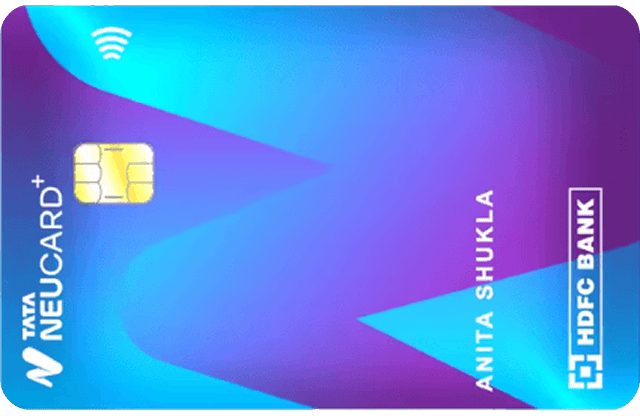
HDFC TATA Plus Credit Card
 Get access to domestic airport lounge access
Get access to domestic airport lounge access  Get 499 Tata Neu Coins
Get 499 Tata Neu Coins Joining Fee: Rs.499/-
Joining Fee: Rs.499/- Annual/Renewal Fee: Rs.499/-
Annual/Renewal Fee: Rs.499/-  Best for Shopping
Best for Shopping
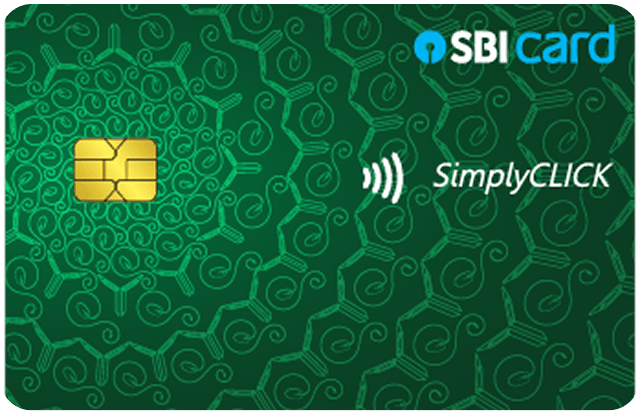
SBI SimplyCLICK Credit Card
 Amazon Gift Voucher for Rs.500
Amazon Gift Voucher for Rs.500 Annual Fee waiver on spending Rs.1,00,000
Annual Fee waiver on spending Rs.1,00,000 Joining Fee = Rs.499 + Taxes
Joining Fee = Rs.499 + Taxes Renewal Fee = Rs.499 + Taxes
Renewal Fee = Rs.499 + Taxes Best online Shopping Card
Best online Shopping Card
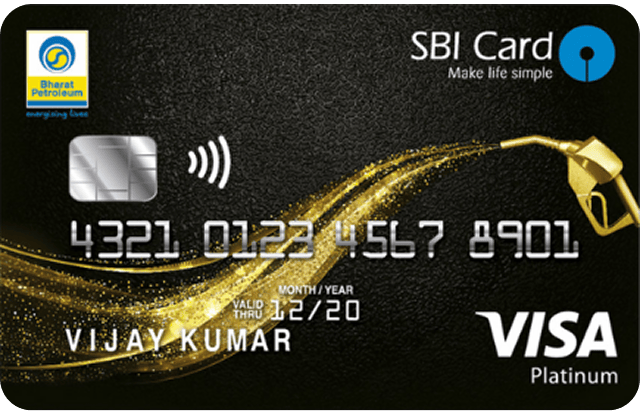
SBI BPCL Credit Card
 2000 Bonus Reward Points with Welcome Gift of Rs. 500
2000 Bonus Reward Points with Welcome Gift of Rs. 500  4.25% Fuel surcharge waiver above Rs.4000
4.25% Fuel surcharge waiver above Rs.4000  Joining Fee: Rs.499
Joining Fee: Rs.499  Annual/Renewal Fee: Rs.499
Annual/Renewal Fee: Rs.499  Best Fuel Purchase Card
Best Fuel Purchase Card
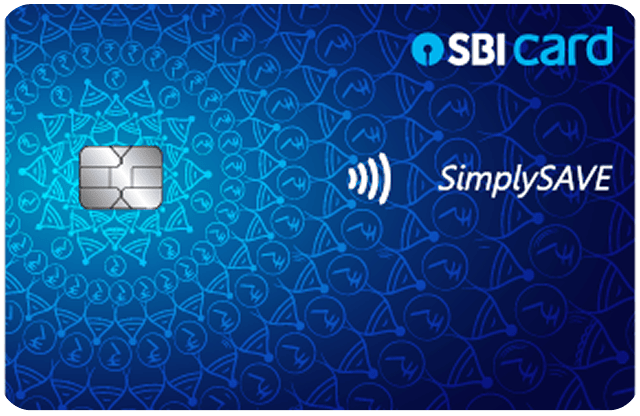
SBI SimplySAVE Credit Card
 2000 reward points on the first Rs.2000 spent within 60 days.
2000 reward points on the first Rs.2000 spent within 60 days. Renewal fee waiver on spend of Rs.1,00,000.
Renewal fee waiver on spend of Rs.1,00,000. Joining Fee: Rs.499 + Taxes
Joining Fee: Rs.499 + Taxes Renewal Fee: Rs.499 + Taxes
Renewal Fee: Rs.499 + Taxes Best for Everyday Spendings
Best for Everyday Spendings
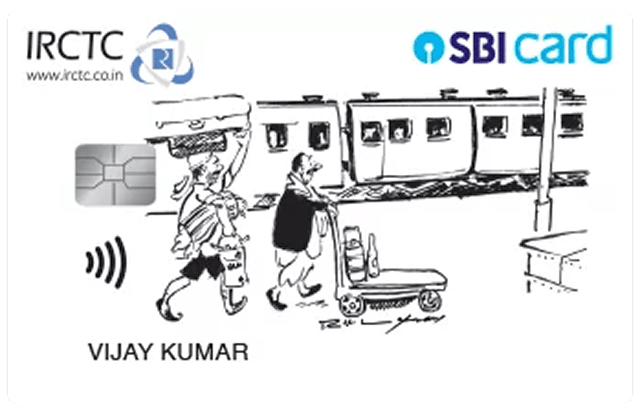
SBI IRCTC Platinum Credit Card
 4 Complimentary Railway Lounge Access per year
4 Complimentary Railway Lounge Access per year 1% Fuel Surcharge Waiver between Rs.500 to Rs.3000
1% Fuel Surcharge Waiver between Rs.500 to Rs.3000 Joining Fee: Rs.500 + Taxes
Joining Fee: Rs.500 + Taxes Renewal Fee/Annual Fee: Rs.500 + Taxes
Renewal Fee/Annual Fee: Rs.500 + Taxes Best Travel Card
Best Travel Card
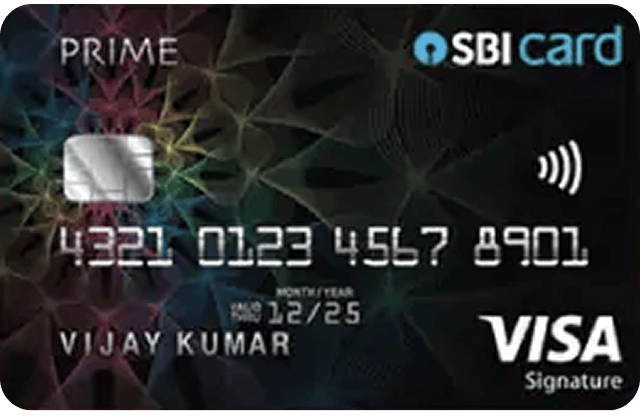
SBI Prime Credit Card
 Welcome e-gift voucher of Rs.3000
Welcome e-gift voucher of Rs.3000 Renewal Fee waiver on annual spend of Rs.3,00,000
Renewal Fee waiver on annual spend of Rs.3,00,000 Joining Fee: Rs.2,999 + Taxes
Joining Fee: Rs.2,999 + Taxes Renewal/Annual Fee: Rs.2,999 + Taxes
Renewal/Annual Fee: Rs.2,999 + Taxes Best Card for spending, milestone benefits, and travel
Best Card for spending, milestone benefits, and travel
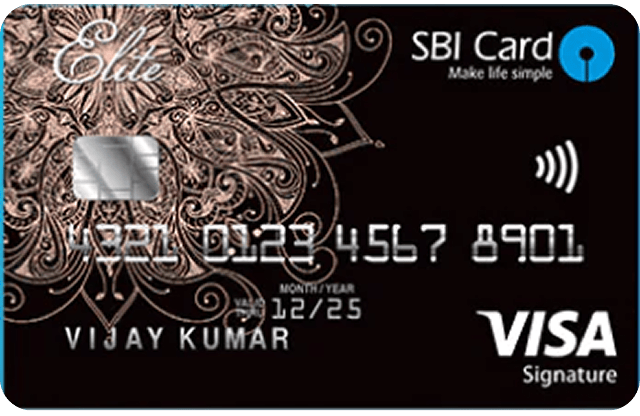
SBI Elite Credit Card
 Welcome E-Gift Voucher of Rs.5,000
Welcome E-Gift Voucher of Rs.5,000 Complimentary International Airport Lounge Access
Complimentary International Airport Lounge Access Joining Fee: Rs.4,999 + Taxes
Joining Fee: Rs.4,999 + Taxes Renewal Fee: Rs.4,999 + Taxes
Renewal Fee: Rs.4,999 + Taxes Best Premium Travel & Lifestyle benefit card
Best Premium Travel & Lifestyle benefit card
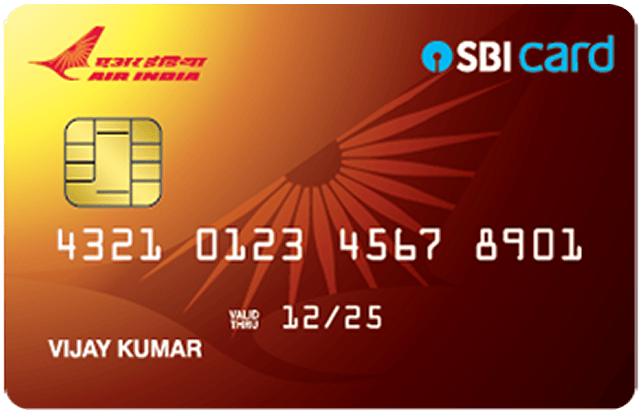
SBI Air India Platinum Credit Card
 Welcome benefit of 5000 reward points.
Welcome benefit of 5000 reward points. 15,000 Bonus Reward Points
15,000 Bonus Reward Points Joining Fee: Rs.1,499 + Taxes
Joining Fee: Rs.1,499 + Taxes Annual/Renewal Fee: Rs.1,499 + Taxes
Annual/Renewal Fee: Rs.1,499 + Taxes Best AirIndia Travel Card
Best AirIndia Travel Card
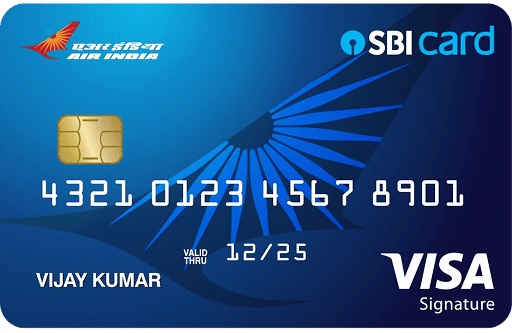
SBI Air India Signature Credit Card
 Welcome Benefit of 20,000 reward points
Welcome Benefit of 20,000 reward points 8 complimentary domestic airport lounge access
8 complimentary domestic airport lounge access Joining Fee: Rs.4,999 + Taxes
Joining Fee: Rs.4,999 + Taxes Renewal Fee: Rs.4,999 + Taxes
Renewal Fee: Rs.4,999 + Taxes Best Travel Card
Best Travel Card
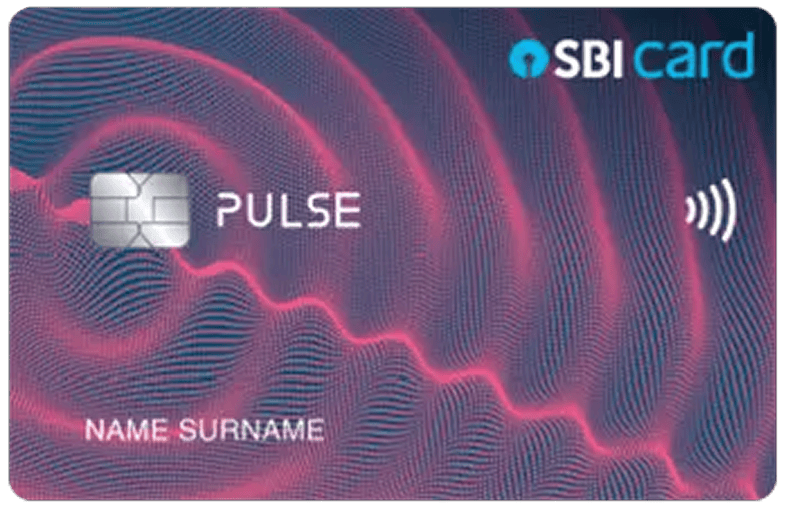
SBI Pulse Credit Card
 Welcome gift of a Noise ColorFit Pulse 4 Pro Smart Watch
Welcome gift of a Noise ColorFit Pulse 4 Pro Smart Watch Complimentary 8 domestic lounge access
Complimentary 8 domestic lounge access Joining Fee: Rs.1,499 + Taxes
Joining Fee: Rs.1,499 + Taxes Renewal Fee: Rs.1,499 + Taxes
Renewal Fee: Rs.1,499 + Taxes Best Health & Fitness Card
Best Health & Fitness Card
Disclaimer: The credit cards featured here are handpicked for 2025 based on overall value, benefits, and real-world usability. Your ideal card depends on your lifestyle, spending pattern, and eligibility. Whether you're looking for rewards, travel perks, or cashback — this list covers top options across all key categories.
Credit Card Tips for Beginner
Learn the smart way to use your first credit card — from paying on time to tracking spends and avoiding hidden fees — and start building credit with confidence.
Quick Links

- 60+ credit cards from Top Banks
- Lifetime Free Cards
- Get high approval chances
- Rewards on groceries, dining, fuel, movies
Things to Know Before Applying for a Credit Card
Applying for a credit card might seem like a quick process, but you need to make comparisons before choosing the right one. This process is intrinsic, but with a range of cards offering different features, benefits, and fee structures, it's essential to know what you're signing up for.
The following are some things to know before applying for a credit card. They are:

Check your Credit Score:
Your credit score is one of the first and foremost criteria that will earn you a credit card. Any credit score of 750 and above will earn your premium credit cards.
Credit Card Type:
Always go in for a credit card based on your lifestyle. There are reward cards, cashback cards, travel cards, fuel cards, lifetime free cards, and secured cards.
Fees and Charges:
Having a basic understanding of the fees, interest, and charges associated with the credit card will help you plan your usage accordingly.
Income:
Banks will award credit cards based on your income. A higher income will earn you premium credit cards.
Rewards and Benefits:
Get to know the rewards and benefits that you can enjoy with a credit card. Look in for cashback offers, lounge access, travel benefits, and fuel surcharge waivers while going for a credit card.

Compare Between Lenders:
Always cross-check between lenders before rounding in to get the best credit card. Look for welcome offers, zero annual fee options, and so on.
Features & Benefits of a Credit Card
Credit Cards come with a range of benefits. They bring in the best advantage of cashless payments, help you accelerate your credit score, and help you out in cash-crunch situations. Some of the attractive benefits of using a Credit Card in India are displayed in detail in the following table.














Types of Credit Cards
- Rewards Cards
- Cashback Cards
- Travel Cards
- Fuel Cards
- Lifetime Free Cards
- Secured Credit Cards

Rewards Cards
If you are on the lookout for credit cards that will earn you a lot of rewards for the spending you make, then Reward Cards are the best option for you. The best reward credit cards are the ones that help you derive cash benefits or other perks on every purchase you make with the card. Want to find the Best Reward Credit Cards in India, do check this article.
These reward credit cards come with the following benefits. They are:
- Earn cash points, cash back, or air miles for every purchase you make.
- Reward Points redeemed for credit card statements & online shopping.
- Most reward credit cards do not charge any annual fee.

Cashback Cards
Who does not like to get rewarded for spending? That too in Cash. Cashback cards are meant to do this. These credit cards are designed to earn cash rewards on every purchase you make. Cash-back credit cards are one of the most innovative methods to maximize the value of everyday purchases. In case of detailed insight on Cashback Credit Cards, do check in our article of What is Cashback Credit Cards?
The following are some of the benefits of having a cashback credit card. They are:
- Real Money back for every spend
- Automatic Savings
- No Redemption Difficulties
- Useful for every category
- Lower Effective cost of spending
- Instant Rewards
There are many cashback credit cards available on the market. However, please take a look at our page featuring the Best 5 Cashback Credit Cards in India here.

Travel Cards
Dreaming of your next vacation? What if the swipe of your card gets you nearer to it with added benefits? Yes. We are talking about Travel Credit Cards. They are not only meant for spending but also for exploring the world. There are various Travel Credit Cards available. In case if you have any queries do check our article on the Best 5 Travel Credit Cards in India.
The following are some of the benefits of a travel credit card. They are:
- Rewards and Airmiles Points
- Complimentary Lounge Access
- Reduction in Forex Markup
- Emergency Travel Insurance
- Discounts and Privileges on Hotel and Dining
Several travel cards are offered by leading banks in the country. But always opt for the best ones to maximize the benefits that come with the card. In case of guidance in choosing the best travel credit cards, check our article on the Best 5 Travel Credit Cards in India.

Fuel Cards
Are you tired of fuel prices burning in your pockets? Fuel Credit Cards are built to ease your burden. Every time you refuel your car or bike, you can earn cashback, fuel surcharge waivers, and reward points. If your list of expenses includes fuel as a regular expense, switching to a fuel credit card will help you amplify your savings beyond the rewards that come with it.
The following are some of the advantages of Fuel Credit Cards. They are:
- Reward Points
- Redemption of Reward Points
- Fuel Surcharge Waivers
- Waiver on Annual Fee waiver on milestone spendings.
- Benefit from Co-branding like HPCL, BPCL, IOCL, and so on.
- Additional Benefits like roadside assistance, car-related discounts, and so on.

Lifetime Free Cards
Benefits on Credit Cards can be availed at moderate fees.Lifetime Free Credit Cards are a classic example of this. These cards come with zero annual fees and, at the same time, offer valuable features such as reward points, cashback, discounts, and EMI options. You can apply for a free credit card either online or offline, do check out the article on How to Apply for a Lifetime Free Credit Card Online.
The following are some of the advantages of using lifetime free cards. They are:
- No Annual Fees
- Budget-friendly
- Builds credit history
- Full Benefits at Zero Cost

Secured Credit Cards
Are you struggling to repair your credit score? A secured credit card could be your first step forward. Fixed deposits back these cards and come with all the features of a regular credit card. This includes rewards and online spending. A secured credit card can help you spend smart and responsibly rebuilding your credit.
Various banks and financial institutions provide innumerable secured credit cards. In case you are on the lookout for guidance, do check our articles on the Best Secured Credit Cards in India.
The following are some of the benefits of secured credit cards. They are:
- NEasy approval
- Credit Limit Based on FD
- Builds credit history
- Low Risk for Banks due to collaterals attached to the card.
- FD Earns Interest
Documents Required to Apply for a Credit Card
When you apply for a credit card, there might be some prerequisites. These documents will vary in content. However, these documents will vary between banks and financial institutions. We have mentioned a list of documents that are required to be submitted while applying for credit cards.

Proof of Identity
Some standard proofs of identity accepted, along with a credit card, include the Aadhaar card, PAN card, Driving license, Voter ID card and Passport.

Proof of Address:
Your Aadhaar card, utility bills (such as gas and electricity bill), rental agreement, passport, ration card, and property documents can all serve as proof of address.

Proof of Income:
Your recent salary slips, Form 16, IT returns, and bank statements are some valid proofs of your income.

Other Documents:
Some documents that may be required include recent passport-size photographs and credit reports.
How to Choose the Right Credit Card
When you apply for a credit card, the bank considers your income, age, credit score, and credit history to determine eligibility and credit limit. However, you also need to select specific criteria to determine which type of credit card best suits your lifestyle and spending habits. Some of the pointers that could prove guidance in choosing the best credit cards are
Understanding your Spending Needs: Make a careful assumption of your spending patterns. Always go in for the credit card that aligns with your spending habits and also gives you enough cashback, discounts, and offers on these specific spendings.
| Fees | Credit Cards come with annual fees. However, some banks offer the advantage of waiving this annual fee for certain milestone expenditures. Assess the need for which you want to go in for the credit cards. |
|---|---|
| Interest Rates | When selecting a credit card, assess the interest rates and other fees associated with it. |
| Security Features | Safety should be a top priority when selecting a credit card. Look for the cards that give you email alerts and mobile alerts on spending. |
| Reward Programs | If you enjoy traveling frequently, look for a card that converts purchases into travel points. Go in for the cards that give you rewards and benefits for every purchase you make. |
| Customer Service and Support | Verify whether the bank that issues the credit card provides customer support. Good customer service comes to your aid, especially during the loss of a card or unwarranted charges on your bill. |
Credit card eligibility criteria
Traversing the eligibility requirements for financing a credit card requires a fundamental understanding of the credit card eligibility criteria that financial institutions have set out. Some of the fundamental eligibility factors that most financial institutions investigate include:
| Age | The minimum age is 18, and the maximum age extends to 60 years old. |
|---|---|
| Income | Steady income required to pay off your credit card bills. |
| Employment Status | You can prove your income through bank statements. |
| Credit Score | A good credit score is one of the advantages of getting a credit card. |
| Other Loans and Liabilities | Banks want to assess the bandwidth that you can accommodate credit. |
How to Apply for a Credit Card
You might be pondering how to apply for a credit card. The following are a series of steps that need to be taken when you apply for a credit card. They are:
01. Choose the right Credit Card
Make the Right Choice of Credit Card based on your needs and spending habits.
02. Check Eligibility Criteria
Ensure your credit profile meets the eligibility requirements.
03. Keep Your Documents Ready
You need to submit some valid documents to get your credit card processed.
04. Apply Online or Offline
Apply for a Credit Card either online or offline.
05.Activate Your Credit Card
Activate Your Credit Card within 60 days or as specified by the bank.





Credit Score & Credit Cards
You might be wondering what role your credit score plays in getting a valid credit card. Credit scores range between 300 and 900. This number represents your creditworthiness or how well you can manage the credit. It is always better to check your credit score before applying for a credit card. A good credit score helps you to improve your chances of securing a sound credit card that secures better interest rates and higher credit limits.
You need to use credit cards responsibly and make timely payments to help build a good credit score. Irresponsible usage of credit cards, like late payments, high credit utilization, and having too many credit cards, can negatively impact your credit score. Check out our article on How Do Credit Cards Impact Your Credit Score?Difference Between a Credit Card and a Debit Card
Although they involve the same cashless purchasing, debit and credit cards have significant differences when it comes to financial management. Debit cards allow you to spend what you have in your bank account. At the same time, credit cards allow you to borrow funds against a credit limit, additional rewards, discounts, and benefits. The following table provides a detailed comparison of the differences between a debit card and a credit card. They are:
| Features | Debit Cards | Credit Cards |
|---|---|---|
| Source of Funds | Your own bank account | Borrows from the bank |
| Spending Limit | Limited to your account balance | Limited to the credit limit set by the bank |
| Interest Charges | Nil | Charged if not repaid to the bank within due date |
| Impact on Credit Score | None | Makes an impact based on credit usage |
| Eligibility | Given along with savings account | Based on income, credit history, and credit score |
| Rewards/Points | Very minimal | More cashback, rewards, and offers |
| Usage | Direct debit for purchases and ATM withdrawals | Used for purchases, bill payments and paying EMIs |
| Repayment | Not Required | Required at the beginning of every payment cycle |
Awards & Recognitions
Years of Excellence
Years of Excellence
Celebrating 10 years of achievements and industry milestones.
Growth Story of the Year
The TiECon Chennai 2018 Award
The Start-Up Category
The Economic Times BFSI Innovation Tribe 2018 Award
For Exemplary Application of IT
The CII Connect Award 2018
Fintech 250
CB Insights 2017
Winner (2017)
Red Herring Asia 100
Presenter
Finovate Asia 2017
Frequently Asked Questions

Latest & Update Credit Card News
5 Best Credit Cards This Diwali9 Oct 2025
SimplyCLICKSBI: 10X Reward Points on Various Portals including Apollo 24X7, BookMyShow, ClearTrip, 5x points on other online spends. CASHBACK SBI: 5% cashback on online spends, 1% cashback on offline spends. Amazon Pay ICICI Bank: 5% on unlimit...
Read moreSimplyCLICKSBI: 10X Reward Points on Various Portals including Apollo 24X7, BookMyShow, ClearTrip, 5x points on other online spends. CASHBACK SBI: 5% cashback on online spends, 1% cashback on offline spends. Amazon Pay ICICI Bank: 5% on unlimited purchases for Amazon Prime members, 3% for non-Prime Customers, Dining Discounts Under Culinary Delights, No Expiry on Reward Points. HDFC Millenia Credit Card: 5% on various portals on Amazon, Flipkart, Swiggy, Zomato, BookMyShow,10% Additional Discount on Swiggy Dineout, 1% cashback on other transactions. HDFC Infinia Credit Card: Free Club Marriott Membership for the first year, Unlimited Worldwide Airport Lounge Access, 5% cashback on Amazon Purchases, 2% at Partner Merchants, 1% Elsewhere.
Indigo SBI Card: Co-branded Credit Card Launch26 Sep 2025
Indigo and SBI together have come up as a team in a credit card series. This credit card is issued in two different variants. Indigo SBI Card and Indigo SBI Card Elite. This is a part of the Blu-Chip royalty program. SBI Indigo cardholders can earn r...
Read moreIndigo and SBI together have come up as a team in a credit card series. This credit card is issued in two different variants. Indigo SBI Card and Indigo SBI Card Elite. This is a part of the Blu-Chip royalty program. SBI Indigo cardholders can earn rewards on all spending made within the Indigo ecosystem, as well as on hotel and travel bookings. Travel is one of the most essential expenses for SBI cardholders. This card has been introduced as a privilege for such travelers to earn while they travel, providing a holistic travel experience. This card will give SBI credit card holders a holistic and rewarding travel experience.
CRED Announces 18-Karat Gold Credit Card with IndusInd Bank and RuPay18 Sep 2025
CRED has partnered with IndusInd Bank to launch a Sovereign credit card featuring an 18-karat gold Gullioche engraving. The card comes with zero joining fees and a 2-minute digital onboarding process. CRED has introduced a lifestyle premium credit ca...
Read moreCRED has partnered with IndusInd Bank to launch a Sovereign credit card featuring an 18-karat gold Gullioche engraving. The card comes with zero joining fees and a 2-minute digital onboarding process. CRED has introduced a lifestyle premium credit card offering users 5% off on all online transactions, 1% off on offline transactions, and 1% off on UPI spends. You can redeem across 500 CRED Pay merchants, 2000 products on CRED score, flights, and in over 8 lakh hotels. This card is designed for the affluent sector and digitally accustomed customers.
Amazon Pay and ICICI Bank to Continue Their Collaboration18 Sep 2025
Amazon Pay and ICICI Bank recently expressed their desire to extend their collaboration of their credit card. This collaboration has been one of the most important and successful co-branded cards in the country. This indicates that Indian consumers a...
Read moreAmazon Pay and ICICI Bank recently expressed their desire to extend their collaboration of their credit card. This collaboration has been one of the most important and successful co-branded cards in the country. This indicates that Indian consumers are on the search of value-driven fintech products. This co-branded credit card is highly used by travel freak and digitally savvy Indian consumers who are on the lookout for smarter ways to pay globally. Apart from the travel benefits, the card comes with no fees and unlimited cashback making it one of the most sought-after by consumers.
Unity Bank and BharatPe Join Hands to Launch EMI-Based Credit Card16 Sep 2025
BharatPe along with Unity Bank launches the India’s first EMI based Credit Card on the RuPay network. This card can be easily linked to UPI that enables secure and convenient payments. There is no joining fees, annual fees, processing fees, or forecl...
Read moreBharatPe along with Unity Bank launches the India’s first EMI based Credit Card on the RuPay network. This card can be easily linked to UPI that enables secure and convenient payments. There is no joining fees, annual fees, processing fees, or foreclosure penalties. The card comes with flexible EMI option for 12 months helping customers to manage big expenses. A 2% zillion coin reward on every transaction upon EMI conversion. The zillion coin earned can be redeemed for brand vouchers, products, or credit card bill payments. The card comes with extra lifestyle benefits, complimentary domestic and international lounge access apart from preventive health check-ups.
Credit Card - Customer Reviews
SAMSAY
Very relevant offers,very good
ROSHINI
Suitable loan and card products.,Good website - easy to use,good
RUMKANI
Good website - easy to use,
OMKAR
Usefulness of information,Credit Report Analysis,Website/app interface,Product offers,
RAVINDRA
Usefulness of information,
Write a review
Choose Credit Card By Bank
- AU SMALL FINANCE BANK LIMITED Credit Card
- Bajaj RBL Super Card Credit Card
- Fibe Credit Card
- HDFC Bank Credit Card
- HSBC Credit Card
- ICICI Bank Credit Card
- IDFC Credit Card
- INDUSIND Bank Credit Card
- KOTAK Credit Card
- RBL Credit Card
- Rupicard Credit Card
- SBI Credit Card
- SCB Credit Card
- Standard Chartered Credit Cards Credit Card
- Yes Bank Credit Card















